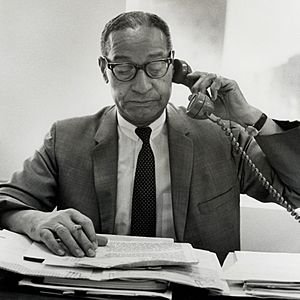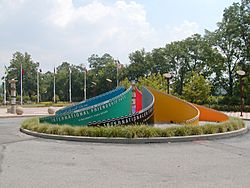Ted Berry facts for kids
Quick facts for kids
Theodore Moody Berry
|
|
|---|---|

Berry at work in the Office of Economic Opportunity c. 1965
|
|
| Born | November 8, 1905 Maysville, Kentucky, U.S.
|
| Died | October 15, 2000 (aged 94) Cincinnati, Ohio, U.S.
|
| Alma mater | University of Cincinnati University of Cincinnati College of Law |
| Occupation | Civil rights attorney Politician |
| Spouse(s) | Johnnie Mae Berry |
Theodore Moody Berry (November 8, 1905 – October 15, 2000) was an important American politician. He was a member of the Charter Party in Cincinnati, Ohio. He made history as the first African-American mayor of Cincinnati, Ohio.
Contents
Early Life and Education
Ted Berry was born in Maysville, Kentucky, on November 8, 1905. He grew up in a poor family. Despite many challenges, he became very successful. He also became a well-known leader in the Civil Rights Movement. This movement worked for equal rights for all people.
He graduated from Woodward High School in 1924. He was the top student in his class, called the valedictorian. He was the first African American to achieve this honor in Cincinnati. In his last year of high school, he won an essay contest. He had to use a fake name for his entry. This was because an all-white group had rejected his first essay. Ted Berry worked in steel mills in Newport, Kentucky, to pay for his college. He attended the University of Cincinnati and later its law school.
Legal Career and Civil Rights Work
Berry became a lawyer in Ohio in 1932. He led the Cincinnati branch of the NAACP from 1932 to 1946. The NAACP is a group that fights for the rights of African Americans. In 1938, he became the first black assistant prosecuting attorney for Hamilton County.
Military Service During World War II
During World War II, Berry worked for the Office of War Information. He helped keep up the spirits of people during the war. This job took him to Washington, D.C. It also led him to change his political party from Republican to Democrat.
In 1945, Berry helped three black officers from the Tuskegee Airmen. These brave pilots had protested against a segregated club in Indiana. Berry won freedom for two of the men. In 1995, the Air Force officially pardoned the third officer.
NAACP and Urban League Efforts
From 1947 to 1961, Berry was part of the NAACP Ohio Committee. This group worked on laws for equal job opportunities and fair housing. He also worked with the Urban League of Greater Cincinnati. This group helps people in cities find jobs and housing.
Political Career in Cincinnati
Berry started his political journey in Cincinnati in 1947. He ran for City Council but did not win that year. However, he won a seat in 1949. In 1953, he led the finance committee. He worked hard to create a city income tax, which was a big debate at the time. In 1955, he was elected vice mayor.
In 1965, President Lyndon Johnson chose Berry for an important role. Berry led the Community Action Programs for the Office of Economic Opportunity. These programs included well-known initiatives like Head Start, the Job Corps, and Legal Services. These programs helped people in need across the country.
Berry came back to Cincinnati in 1969. He was appointed to the City Council in 1971. In 1972, he was elected mayor. He served for four years, becoming Cincinnati's first African-American mayor. In the 1980s and 1990s, Berry worked to bring back proportional representation to Cincinnati. He believed this system would give Black voters a fair share of power.
Death and Lasting Impact

Ted Berry passed away on October 15, 2000, at the age of 94. Many other important Black leaders from Cincinnati looked up to him. These included Marian Spencer and Judge Nathaniel R. Jones. The city of Cincinnati has honored Berry by naming both a street and a park after him.
Awards and Memberships
Mayor Berry was a Prince Hall Freemason. He was also a member of the Alpha Phi Alpha fraternity. He helped start the Alpha Rho Lambda Chapter of this fraternity in Columbus, Ohio, in 1929. In 1979, the NAACP gave Berry a special award. It was called the William Robert Ming Advocacy Award. This award recognized his dedication and sacrifice in his legal work.
 | Charles R. Drew |
 | Benjamin Banneker |
 | Jane C. Wright |
 | Roger Arliner Young |

